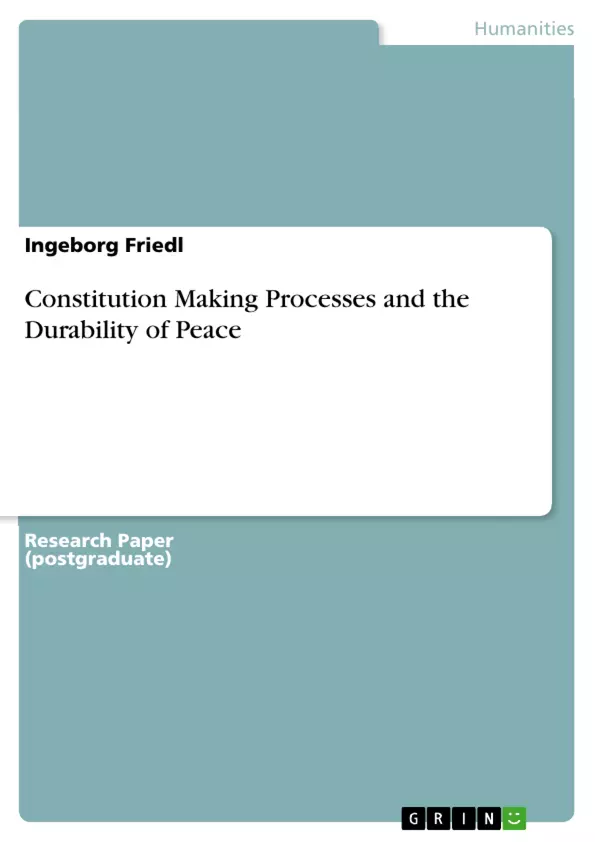
Constitution Making Processes and the Durability of Peace
Forschungsarbeit, 2009
16 Seiten, Note: 1,0
Leseprobe
Inhaltsverzeichnis (Table of Contents)
- I. INTRODUCTION
- II. THEORETICAL FRAMEWORK
- A. Publicity
- B. Participation
- C. Representation
- D. Plurality of democracies
- E. Reflexivity
- F. The veil of ignorance
- III. RESEARCH DESIGN
Zielsetzung und Themenschwerpunkte (Objectives and Key Themes)
The study investigates the connection between the type of constitution-building process and the sustainability of peace, particularly examining why some constitution-building processes contribute to lasting peace while others fail. The paper also explores the challenges policymakers face when reforming the constitutions of conflict-ridden nations.
- Influence of the constitution-building process on peace
- Role of representation and participation in the process
- Impact of constitution building on democratic development
- Challenges of constitution reform in post-conflict contexts
- Comparison of different constitution-building models
Zusammenfassung der Kapitel (Chapter Summaries)
The first chapter introduces the topic of constitution-building processes in post-conflict settings and outlines the research question. The chapter discusses the challenges and complexities associated with constitution building and highlights the need for a comprehensive analysis of the link between constitution-building processes and peace.
The second chapter presents the theoretical framework underpinning the study. The chapter reviews existing literature on constitution building and analyzes the various theories that have been proposed to explain the link between participatory constitution-building and peace. The chapter also delves into the different principles that contribute to a successful constitution-building process, including publicity, participation, representation, plurality of democracies, reflexivity, and the veil of ignorance.
The third chapter outlines the research design employed in the study. The chapter describes the methodology for analyzing the constitution-building processes in selected case studies and discusses the dependent and independent variables under investigation. The chapter also clarifies the criteria for defining "durable peace" and outlines the data sources used in the study.
Schlüsselwörter (Keywords)
The study focuses on the connection between constitution-building processes, participation, representation, and the durability of peace. The paper draws on concepts such as participatory constitution building, democratic development, conflict resolution, and post-conflict reconstruction. The research also addresses the challenges of constitution reform, legitimacy, and the role of international actors in constitution-building processes.
Frequently Asked Questions
How does constitution-building influence peace?
The study explores how the process of drafting a constitution can either stabilize a war-shattered country or fail to prevent future conflict depending on its design.
What are the key principles for a successful process?
Principles such as publicity, participation, representation, plurality of democracies, and reflexivity are considered vital for a durable peace.
What is the "veil of ignorance" in this context?
It is a theoretical framework used to ensure fairness in the constitution-making process by encouraging drafters to look beyond their personal interests.
Which countries were compared in this research?
The research used a structured focused comparison between the constitution-building processes of Nicaragua and Peru.
What role do international actors play?
International actors often support peacekeeping missions by helping to redraft legal bases, though this can sometimes be an opaque process.
Details
- Titel
- Constitution Making Processes and the Durability of Peace
- Hochschule
- Uppsala Universitet (Department for Peace and Conflict Research)
- Veranstaltung
- Peace, War and Democratisation
- Note
- 1,0
- Autor
- Ingeborg Friedl (Autor:in)
- Erscheinungsjahr
- 2009
- Seiten
- 16
- Katalognummer
- V162662
- ISBN (eBook)
- 9783640779987
- ISBN (Buch)
- 9783640780679
- Dateigröße
- 453 KB
- Sprache
- Englisch
- Schlagworte
- constitution making durability of peace Nicaragua Peru representation Sandinista Fujimori
- Produktsicherheit
- GRIN Publishing GmbH
- Preis (Ebook)
- US$ 13,99
- Preis (Book)
- US$ 16,99
- Arbeit zitieren
- Ingeborg Friedl (Autor:in), 2009, Constitution Making Processes and the Durability of Peace, München, Page::Imprint:: GRINVerlagOHG, https://www.diplomarbeiten24.de/document/162662
- Autor werden
- Ihre Optionen
- Vertriebskanäle
- Premium Services
- Autorenprofil
- Textarten und Formate
- Services für Verlage, Hochschulen, Unternehmen

- © GRIN Publishing GmbH.
- Alle Inhalte urheberrechtlich geschützt. Kopieren und verbreiten untersagt.
- info@grin.com
- AGB
- Open Publishing
Der GRIN Verlag hat sich seit 1998 auf die Veröffentlichung akademischer eBooks und Bücher spezialisiert. Der GRIN Verlag steht damit als erstes Unternehmen für User Generated Quality Content. Die Verlagsseiten GRIN.com, Hausarbeiten.de und Diplomarbeiten24 bieten für Hochschullehrer, Absolventen und Studenten die ideale Plattform, wissenschaftliche Texte wie Hausarbeiten, Referate, Bachelorarbeiten, Masterarbeiten, Diplomarbeiten, Dissertationen und wissenschaftliche Aufsätze einem breiten Publikum zu präsentieren.
Kostenfreie Veröffentlichung: Hausarbeit, Bachelorarbeit, Diplomarbeit, Dissertation, Masterarbeit, Interpretation oder Referat jetzt veröffentlichen!
- GRIN Verlag GmbH
-
- Nymphenburger Str. 86
- 80636
- Munich, Deutschland
- +49 89-550559-0
- +49 89-550559-10
- info@grin.com
-









